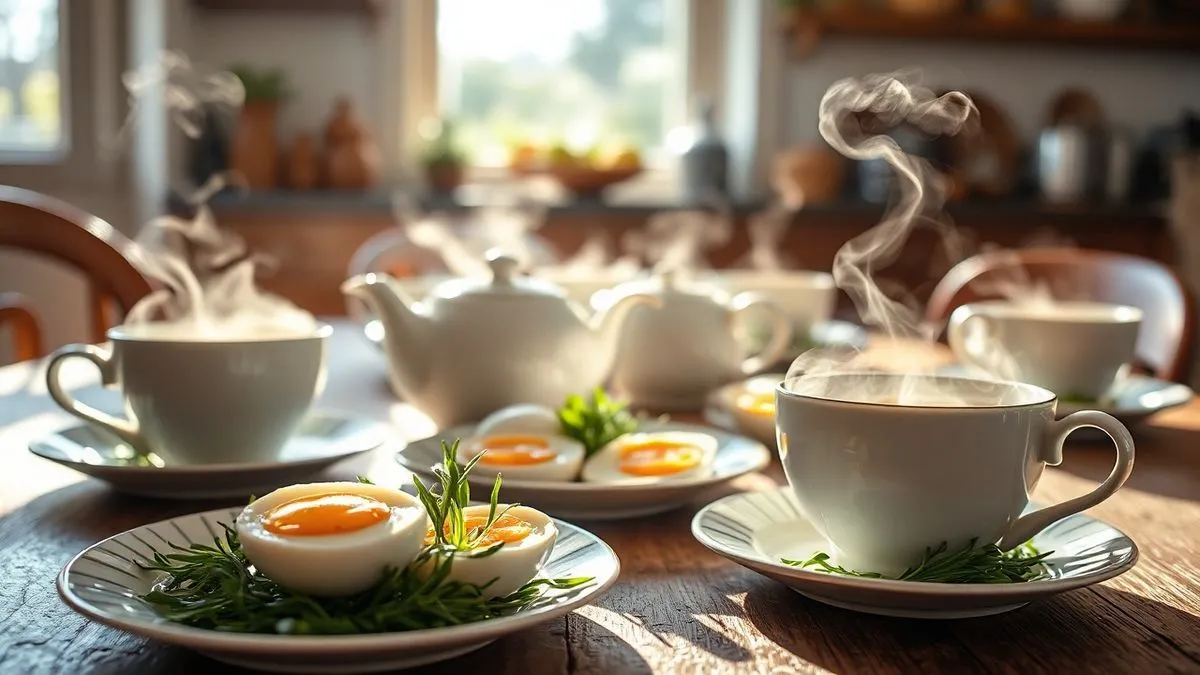If you’re looking for a fun and tasty snack, tea eggs are where it’s at! These flavorful little treats are not just easy to make, but they also pack a punch when it comes to taste. Let’s dive into everything you need to know about making the perfect tea eggs, from the ingredients to the cooking process, and even some tips for serving them up.

What Are Tea Eggs?
Tea eggs are a popular snack in many Asian countries, especially in China. They’re hard-boiled eggs that are cracked and then simmered in a mixture of tea, soy sauce, and spices. The result? Beautiful marbled eggs with a savory flavor that’s hard to resist. They’re perfect for munching on their own or adding to a meal.
Ingredients You’ll Need
To whip up a batch of tea eggs, you’ll need some simple ingredients. Here’s what you’ll need to gather:
- Eggs: 6-8 large eggs (make sure they’re fresh!)
- Black tea: 2-3 bags or 2 tablespoons of loose leaf
- Soy sauce: 1/2 cup (use a halal-certified brand)
- Star anise: 2-3 pieces (this adds a lovely aroma)
- Cinnamon stick: 1 (for a warm, spicy flavor)
- Salt: 1 teaspoon
- Water: Enough to cover the eggs in the pot
- Optional spices: You can also add a few slices of ginger or a dash of five-spice powder for extra flavor.
Step-by-Step Instructions
1. Boil the Eggs
Start by placing your eggs in a pot and covering them with water. Bring the water to a boil over medium-high heat. Once it’s boiling, let the eggs cook for about 8-10 minutes. This will give you a nice hard-boiled egg.
2. Cool and Crack the Eggs
Once the eggs are done, transfer them to a bowl of ice water. This will help cool them down quickly and make peeling easier. After they’ve cooled for about 5-10 minutes, gently tap each egg on a hard surface to crack the shell. You want to create a nice pattern but not peel them just yet!
3. Prepare the Tea Mixture
In a separate pot, combine the black tea bags (or loose leaf), soy sauce, star anise, cinnamon stick, salt, and about 4 cups of water. Bring this mixture to a boil, then reduce the heat and let it simmer for about 5 minutes. This will help the flavors meld together.
4. Simmer the Eggs
Carefully place the cracked eggs into the tea mixture. Make sure they’re submerged in the liquid. Let them simmer on low heat for about 30 minutes. The longer you let them sit, the more flavor they’ll absorb. If you want a stronger flavor, you can let them simmer for up to an hour.
5. Steep for Extra Flavor
After simmering, turn off the heat and let the eggs sit in the tea mixture for at least 2 hours. For the best results, let them steep overnight in the fridge. This will give them a beautiful marbled appearance and a rich flavor.
Serving Suggestions
Tea eggs are super versatile! Here are a few ideas on how to enjoy them:
- Snack Time: Just peel and eat them as a quick snack. They’re great on their own!
- Salads: Slice them up and toss them in a salad for added protein and flavor.
- Rice Bowls: Serve them over rice with some steamed veggies for a hearty meal.
- Bento Boxes: Pack them in a bento box for a fun lunch option.
Storing Your Tea Eggs
If you have leftovers (which is rare because they’re so good!), you can store them in the fridge. Keep them in the tea mixture for the best flavor. They’ll last about 3-5 days in the fridge. Just make sure to keep them covered!
FAQs About Tea Eggs
Can I use different types of tea?
Absolutely! While black tea is traditional, you can experiment with green tea or even herbal teas for a unique twist.
Are tea eggs spicy?
Not really! The spices used in the recipe add flavor, but they’re not spicy. If you like a kick, you can add some chili flakes to the tea mixture.
Can I make tea eggs vegan?
You can’t really make tea eggs vegan since they’re based on eggs, but you can try using tofu as a substitute. Just marinate the tofu in the tea mixture for a similar flavor.
How do I know when the eggs are done boiling?
A good rule of thumb is to boil them for about 8-10 minutes for hard-boiled eggs.